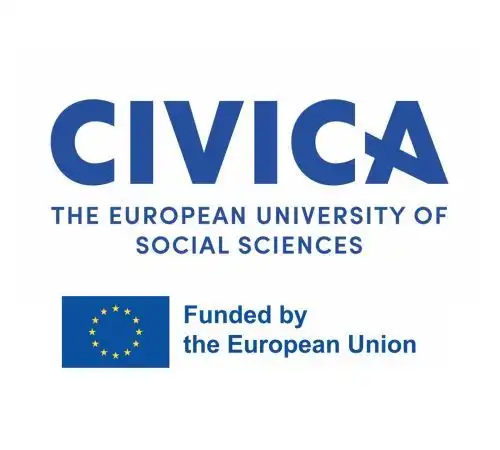Home>European Youth: Meet Our CIVICA Student Ambassadors 2024

13.11.2024
European Youth: Meet Our CIVICA Student Ambassadors 2024
Sciences Po is a founding member of CIVICA – the European university of social sciences, an alliance of 10 renown universities implemented all across Europe, funded under the Erasmus+ programme. Every year, each university selects its CIVICA student (and early stage researchers) Ambassadors to represent their institution in the alliance. Their role is to promote interaction and exchange within the alliance's communities, and be a first point of contact to CIVICA for their peers. The Ambassadors network actively shapes CIVICA by initiating bottom-up projects and participating in formal and informal alliance activities.
Meet Jules, Juliette, and Justin, Sciences Po's CIVICA Ambassadors for the academic year 2024/25:
- Jules Mateo Nerlich is a Franco-German Bachelor's student from the dual degree with Freie Universität (Berlin),
- Juliette Font is a French Master's student enrolled at the School of Public Affairs, in the brand-new Education and Research policy stream,
- Justin Hu is an American Master's student studying history at the School of Research. Justin Hu is also a laureate of the Michel David-Weill Scholarship, a programme to promote transatlantic exchange created by a Sciences Po alumnus. The $80,000 Scholarship is awarded each year to one American student who exemplifies the core values embodied by its namesake: excellence, leadership, multiculturalism, and high achievement.
How is European cooperation relevant to your academic journey?
Jules: The focus of my dual bachelor between Sciences Po and the FU in Berlin is Franco-German relations and their partnership in the European Union. Therefore, European cooperation is at the heart of my academic studies, with numerous courses of mine being centred around this.
Juliette: European cooperation is crucial for advancing research and education policies, as it enables shared solutions to challenges affecting multiple nations, such as educational inequality and access to higher education. This collaboration fosters a rich exchange of knowledge, practices, and policy insights that deepen my understanding of these issues from a transnational perspective. Engaging with Europe-wide initiatives strengthens my research by integrating diverse approaches and promoting inclusive education systems. The European context is essential for building policies that are adaptable and responsive to the needs of diverse populations across the continent.
Justin: I see the intersection of immigration and education policy as the cornerstone for building more humane and democratic societies today. Our policy paradigms cannot limit themselves to the nation state, and must be reframed in ways that invite non-, supra-, and trans-national imaginations. European cooperation has been a model for how these imaginations have manifested in the past, and how they can be further pushed in the future.
What does CIVICA mean to you?
Jules: CIVICA means being part of a forward-thinking community dedicated to positive change on a European and global scale. For me, it means the chance to connect with new people and collaborate on shared challenges across Europe.
Juliette: To me, CIVICA represents a vast world of knowledge and collaboration, embodying a beautiful vision for the future of universities in Europe. It brings together diverse institutions and disciplines, creating an environment where ideas flourish across borders. CIVICA allows us to approach global challenges with shared resources and expertise, transforming education into a truly European experience. This alliance is not only about academic growth but also about building a community committed to innovation, inclusivity, and unity.
Justin: Crossing cultural and national boundaries to form fresh intellectual and political coalitions.
What will be some of your priorities as a CIVICA Ambassador? What kind of student-led initiatives do you wish to develop?
Jules: My priorities will be to foster connections between students through a range of academic, cultural, and sports activities that go beyond research alone. Promoting awareness and action on environmental issues will be central to my role, from organising sustainability-focused events to supporting eco-friendly campus initiatives. I would love to develop a project based on my civic internship: fighting student food insecurity through environmentally sustainable cheap and healthy meals (Tim & Bastien Food Truck in Nancy).
Juliette: A primary priority will be advocating for feminist and anti-discrimination policies across CIVICA and European academia. I am committed to promoting gender equality, tackling systemic biases, and ensuring that women and other marginalised groups find a supportive, empowering environment in higher education and research. My goal is to create spaces within CIVICA where feminist perspectives shape both research and policy, encouraging inclusive representation at all levels. Additionally, I aim to facilitate the transmission of knowledge, ensuring that ideas, resources, and research circulate freely across institutions, enriching our collective approach to addressing complex societal issues.
Justin: Promoting research and thought that supports more respectful and enriching environments for immigrants. I aim to create cross-campus immigrant research seminars, forums, and working groups, with the focus of developing a paradigm for immigration policy that is not dependent on nation states as the principal actors.




